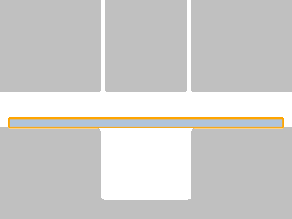Effect of metal working oil
About metal working
At first, the power which a metal plate tries to return to the original form acts while applying power on metal plate gradually.
However, the shape will become changeable to the direction which is applying the power when continuing increasing the further power. A Metal plate doesn't return to original shape, even if
it removed power soon. This property is called "plasticity" and processing which extends or compresses a material by using this property is called "plastic
processing".
About metal working oil
Large friction occurs between the contact surfaces of a dies and a work piece while applying power to the dies without protecting the surface of a dies and a work piece. As a result, cracking, scratches or scoring (scuffing) by frictional heating may occur to a work piece. Furthermore, it may also damage a dies. Then, it is metal working oil which is used in order to protect a dies and a work-piece by reducing friction.
Although there is processing which can also process with ordinary lubricating oils, such as machine oil, a dies and a work piece will be damaged on severe conditions, such as a deep drawing and processing of thick plates. Therefore, it is important that you select the optimal oil according to processing conditions.


Effect of aditive agents including metal working oil
Metal working oil is constituted mixing various additive agents so that neither scoring nor scratches may occur by reducing friction with a dies and a work piece. The content is a few although the additive agent is mixing also in ordinary lubricating oils. Therefore, they may not be suitable for the metal working which is sometime accompanied with high load or the complicated distortion. In other words, although ordinary lubricating oils is used in order to inhibit friction by the lubrication (cylinders, bearings, etc.) which do not cause plastic deformation, they may be unable to correspond to large friction which occurs when metal causes plastic deformation like metal working. Therefore, we recommend using the metal working oil designed according to the purpose in order to to reduce friction between metal surfaces and prevent generating of scratches or scoring.
Metal working oils make by blending oiliness agents, extreme pressure agents,antioxidants, corrosion inhibitors, rust preventive agents, a viscosity index improvers, etc. if
needed.
The Designing metal working oil
When designing the performance of metal working oil, we are considering about not only good processability but also previous process, next process, health or environmental hazards.
<Designed performances>
| (1) Primary performances | Processability, Productivity, etc. |
| (2) Secondary performances |
Influences on tools, implements or resins Degreasing or Rust preventive performances Influence on welding, Stability of oil, etc. |
| (3) Influences on human or environment |
Odor, Irritation, Harmful property, Flammable Disposal method, RoHS/Reach, etc. |
The types of metal working oils
There are many types of metal working oils according to a work material, a processing method, and other performance
requirements. When classifying roughly, they are classified to types describing in the following table.
| Type | Characteristics | Use | |
| Water-insoluble types |
General type |
widely usable |
General forming of steel or aluminum plate, etc. (Water-insoluble oils) |
|
High extreme pressure types |
Suitable for the processing of comparatively severe conditions, such as a thick plate and a difficulty work piece. There is much content of extreme pressure agents and load carrying capacity higher than general types. |
Processing of steel (thick plate), stainless, high tensile strength steel, etc. Deep drawing, Ironing (The Environmentally friendly developed products) (Water-insoluble oils) |
|
|
Volatile types |
Having volatility Oil will hardly remain when drying. There is also types which leaves oil slightly for rust preventive. |
Bending or punching of steel, aluminum plate Mild processing of shallow drawing Suitable also when "skipping a degrease processing" or "annealing with oil adhered". (Water-insoluble oils for punching) |
|
| Water-soluble types |
Cooling capacity is superior to water-soluble types (oil type). Economical since it is able to diluted with water. |
Processing of steel, aluminum plate or thin plate of stainless. Processing which generates high heat (Continuous high-speed processing, thick plate processing, etc.) (Water-soluble oils) |
|
| Solid lubricant dispersed types |
Dispersing solid lubricants in liquefied metal working oil. Assist lubricity and scoring-resistance. |
Severe processing of the work piece which extreme pressure agent is difficult to affect. Hot processing, etc. (About development and research) (Contact us) |
|
Environment which surrounds metal working oils
When using or discarding metal working oil, influence on wokers, the residents and natural environment around a factory or a
disposal plant must be considered because metal working oil consists of various chemical substances.
Recently, various problems about a chemical substance have been taken up. As problems of metal working oil, there is a
problem of a chlorinated extreme pressure agent and a problem of the degreasing process after metal working.
Chlorinated extreme pressure agent and dioxin
The problem was widely known by having detected dioxin at the waste incineration plant and the neighborhood of that. As the
reason dioxin was detected at the waste incineration plant, It is thought that dioxin is generated when the chlorinated organic compounds cause an incomplete combustion. We continue
tackling actively the development and commercial production of non-chlorinated oil used as substitution of chlorinated oil to answer this problem and the request from
customer.
Problem of the degreasing process after metal working.
Solvents or degreasing agents are used in order to remove adhering oil after metal working. However, the degreasing process costs and disposal processing of the used degreasing fluid requires time and effort and expense.
As metal working oils which solves these problems, there are quick-drying metal working oil or volatile metal working oil. These oils can skip the degreasing step after a metal working because they consist of ingredients which volatilize by nature or ventilation dryness.
Besides, there is also a type designed so that oil remain a little in order to improve the rust prevention after processing. This type can reduce the used amount and replacement frequency of degrease liquid.
However, they are used in mild processing in many cases because those lubricities are inferior compared with common metal working oils.






